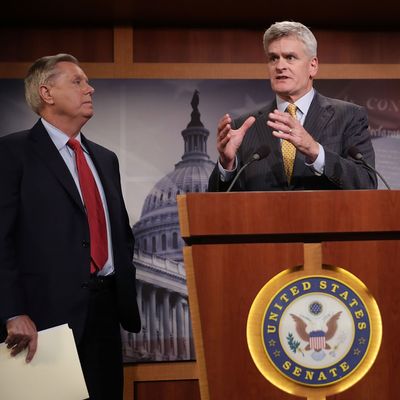
Vox calls it “one last Hail Mary to repeal Obamacare.” Obstacles to its enactment include a lack of enthusiasm among GOP congressional leaders, some very questionable features, and perhaps most importantly an immovable September 30 deadline.
Nonetheless, on Wednesday, Senators Lindsey Graham and Bill Cassidy (probably along with co-sponsor Dean Heller) will unveil the latest version of the health-care bill they first announced in late July. Barring some surprise development, the bill would:
— Convert the Affordable Care Act’s Medicaid-expansion funds and insurance purchasing tax credits into a block grant to the states, allocated by a formula that would shift dollars from Medicaid expansion to non-expansion states.
— The block grant would be capped, and would be eliminated after ten years.
— Medicaid would be subjected to the same per capita cap as was provided in the Better Care Reconciliation Act, the “Trumpcare” proposal that died in the Senate in July.
— States would be given considerable freedom to use block-grant funds as they wished, and a lot of Obamacare regulations (most notably the individual mandate and the definition of essential health benefits) would become optional.
Perhaps the best way to understand Graham-Cassidy is as a version of the earlier Cassidy-Collins “let the states do what they want” approach with a lot less money. According to a Center for Budget and Policy Priorities analysis of the bill as presented in July, the new state block grant would lose more than a third of its value by 2026, at which time it is supposed to close down entirely.
By making so many funding and coverage issues subject to future state decisions, the bill will make it difficult for the CBO to estimate its impact. But other than reducing the deficit, it’s unlikely that the CBO’s report will have reassuring numbers. And again, the timing is extremely difficult: A recent ruling by the Senate parliamentarian means that they only have until the end of September to pass the bill in the Senate.
One slender reed of optimism for the bill is the fact that Senator John McCain, the key vote against the “skinny repeal” bill in July, has made positive noises about his amigo Lindsey Graham’s handiwork. But he’s also said health-care legislation needs to be adopted via “regular order,” which most definitely is not happening by September 30. Moreover, one of the GOP senators who wound up supporting skinny repeal, Rand Paul, has announced opposition to Graham-Cassidy. Paul added insult to injury by saying: “I don’t think it’s going anywhere … I haven’t heard anybody talking about it.”
A key Republican who might start talking about it is Donald J. Trump. Kellyanne Conway recently said Trump would sign Graham-Cassidy if it reached his desk. But the probable demise of the bill could well unleash more presidential furies on Twitter aimed at the Trump’s ostensible GOP allies. And that will make it harder for Republicans to put the horribly embarrassing mess of a failed effort to repeal Obamacare behind them.






























